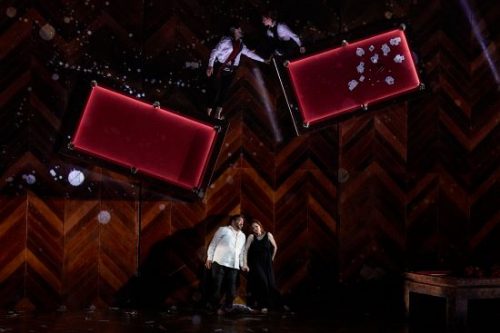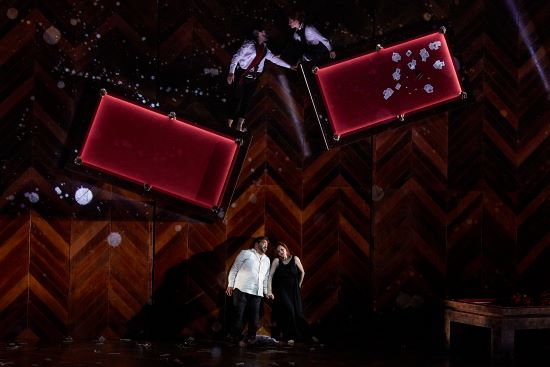 Spain Festival Castell de Peralada [2] – Verdi, La traviata: Intermezzo Chorus, Liceu Orchestra / Riccardo Frizza (conductor), Castle Gardens Auditorium, Peralada, 5.8.2019. (JMI)
Spain Festival Castell de Peralada [2] – Verdi, La traviata: Intermezzo Chorus, Liceu Orchestra / Riccardo Frizza (conductor), Castle Gardens Auditorium, Peralada, 5.8.2019. (JMI)

Production:
Director & Sets – Paco Azorín
Costumes – Ulises Mérida
Lighting – Albert Faura
Choreography – Carlos Martos
Cast:
Violetta – Ekaterina Bakanova
Alfredo – René Barbera
Germont – Quinn Kelsey
Flora – Laura Vilà
Annina – Marta Ubieta
Doctor Grenvil – Stefano Palatchi
Gaston – Vicenç Esteve Madrid
Baron Douphol – Carles Daza
Marquis d’Obigny – Guillem Batllori
This year’s opera at the Castell de Peralada Festival is La traviata in a new production by Paco Azorín. Unfortunately, I found his work of little interest and pretentious as well. His concept presents us with a modern and free Violetta (‘Sempre libera’) who might be well suited to the present day but is far removed from the opera’s plot. While the Germont-Alfredo-Violetta relationship is understandable in the late nineteenth century and first half of the twentieth, it certainly wouldn’t happen nowadays
The sets are by Paco Azorín as well and offer two different stages. In Act I the stage is occupied by four pool tables, and here the action takes place. In the first scene of Act II, the floor is lifted, leaving the pool tables hanging at the back of the stage. At Flora’s party we return to the pool tables (again on the floor), while in the last act the floor and tables are raised once more. The costumes are modern, and the lighting and choreography are adequate.
The stage direction seems to me rather deficient, especially in the second set. The extras are placed descending the hanging tables, while the action takes place down below, but the movement of those extras makes it hard to pay attention to what really counts: the music and the singing. Another critical point is the girl who is often on stage and appears to be the daughter of Violeta and Alfredo (‘Sempre libera’ again). The problem of having children present on stage is that often they are not particularly good actors and spoil the drama, which is what happened on this occasion.
Conductor Riccardo Frizza gave a correct reading and was helpful to the singers. He offered the complete score of the opera and drew a fine performance from the Liceu orchestra. The Intermezzo Chorus was also very good.
The role of Violetta was sung by soprano Ekaterina Bakanova, whose performance was the best of the trio of protagonists. It has often been said that two and even three different sopranos are needed for this opera, and there is some truth in it. Ekaterina Bakanova is a lyric soprano with an attractive voice, who was at her best in the second act. She was a little short on the low notes in Act III, while in Act I she had to scrape the very top notes, especially at the end of ‘Sempre libera’. But all in all she was a convincing Violetta.
Alfredo was interpreted by tenor René Barbera, who has an attractive voice although he was a little short on volume. His biggest problem was a lack of expressiveness on stage, which made him a rather flat Alfredo. The part of Germont was sung by Quinn Kelsey, who was reasonably good, although his voice did not always reach the audience.
In the secondary characters, Laura Vilà was a rather modest Flora, and the same can be said of Stefano Palatchi as Doctor Grenvil. Marta Ubieta did well as Annina, as did Vicenç Esteve Madrid, Carles Daza and Guillem Batllori in their roles.
José M. Irurzun
